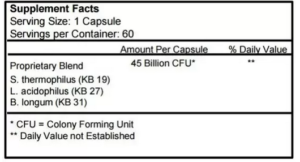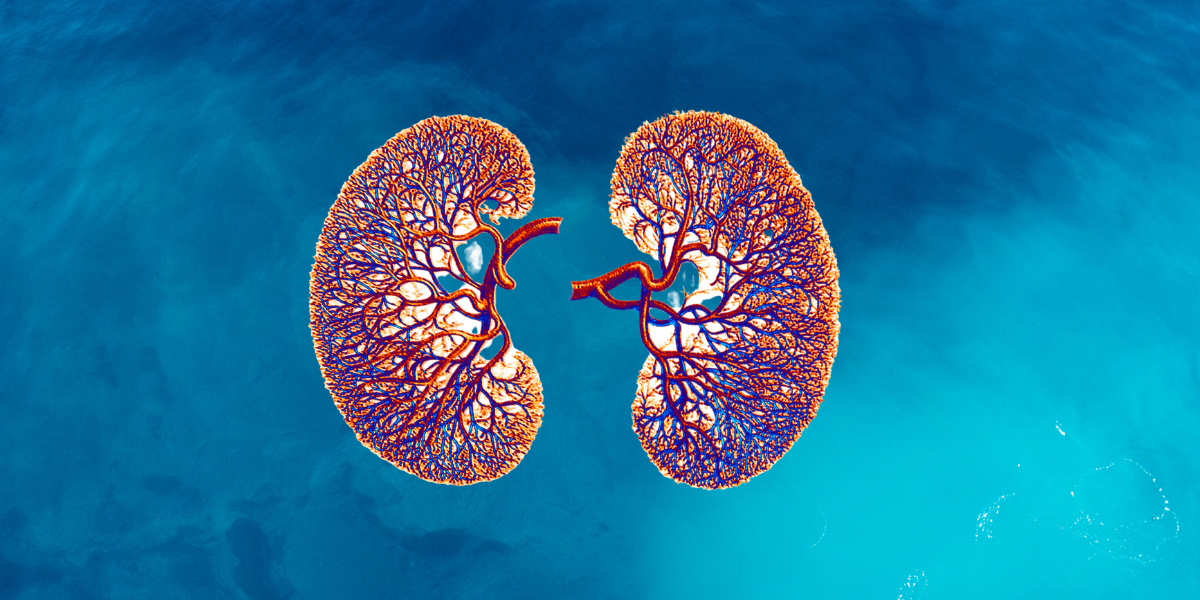Renadyl is described as the world's 1st and only kidney probiotic. The maker of the supplement (Kibow Biotech) states their probiotic establishes kidney balance naturally. So does Renadyl really work? Can a probiotic restore kidney function? Is it a natural supplement for kidney failure? In this review, let's look at the ingredients and clinical studies on this probiotic and see what can be discovered.
How Does Renadyl Work?

The idea behind the supplement is intriguing and may be referred to as enteric toxin removing technology. The supplement works in the large intestine (colon) to modulate the microbiome. According to the company, the unique strains of probiotic bacteria consume nitrogenous waste products as a food source.
Nitrogen waste products, like urea, damage kidney function. As the bacteria consume the nitrogenous waste, they multiply and in doing so, consume even more waste products. As nitrogenous waste levels decline, inflammation and free radical damage also decline. All this can help your kidneys work better. Eventually, you eliminate the nitrogenous waste-consuming microbes in your feces.
The company refers to this process as “intestinal dialysis.” However, you should remember no clinical studies are comparing the effects of traditional dialysis to Renadyl probiotic supplements.
What is BUN?
Urea is a nitrogenous waste product formed as you digest protein from the food you eat. Blood urea nitrogen (BUN) is the urea in your blood. The kidneys normally remove urea from the blood. As kidney function declines, BUN levels start to rise. The worse your kidney function is, the higher the BUN becomes. Normal BUN levels range from 7 to 20 milligrams per deciliter. Thus, doctors can measure BUN levels as an indicator of how well your kidneys are working.
Renadyl Ingredients
One capsule has 45 Billion colony-forming units (CFU) of the following types of bacteria:
- Streptococcus thermophilus (KB 19)
- Lactobacillus acidophilus (KB 27)
- Bifidobacterium longum (KB 31)
All three types are gram-positive, lactic acid-producing bacteria. Take note that KB 19, KB 27, and KB 31 refer to the strains of bacteria. The strain is the specific type of bacteria contained in the supplement. All the bacteria are natural and not genetically modified.

Other Ingredients
The capsules also contain xylo-oligosaccharides, inulin, and magnesium stearate. Both inulin and xylooligosaccharides are prebiotics. Prebiotics are what probiotic bacteria eat for food.
Is Renadyl a Drug?
Even though the name of the manufacturer contains the name BioTech, Renadyl is a dietary supplement. No physician prescription is required. Renadyl is not a substitute for medications or for kidney dialysis.
Renadyl Research
The probiotic has been clinically investigated and the company that makes it (Kibow Biotech) supports research on their supplement. Here's a summary of the human research.
Study 1
In one study, 22 people with kidney disease were given either 6 capsules a day of Renadyl or a placebo, for 2 months each. Results showed no significant improvement in kidney function in those taking the probiotic supplement. Renadyl did not result in fewer kidney dialysis treatments.
Researchers did show the probiotic reduced white blood cells, C reactive protein (CRP), a marker of cellular inflammation as well as a kidney toxin called indoxyl glucuronide. However, none of these reductions were significantly different from the placebo. On the plus side, no negative side effects were reported.
Study 2
In another study, 24 middle-aged adults with stage 3 and 4 kidney disease were given various dosages of the Renadyl probiotic to see if it was safe and what effects it had. The study lasted 6 months. Upon completion, people reported improvements in their physical functioning. There were, however no changes in their levels of pain and mental or emotional well-being. Most interesting, however is that researchers reported the supplement promoted significant reductions in:
- Creatinine
- C reactive protein (CRP)
- Hemoglobin
- Hematocrit
It took between 2 and 6 months to see these improvements.
There were no significant improvements in:
- Blood urea nitrogen (BUN)
- Potassium
Does The Stomach Destroy The Probiotic?
The bacteria are contained in acid-resistant gel caps can make it through the stomach without being broken down by digestive juices like hydrochloric acid. This increases the chance the bacteria can be delivered to the large intestine (colon).
Does It Need Refrigeration?
For maximum effectiveness, it's recommended to refrigerate the supplement. The company states Remadyl is stable without refrigeration for up to 2 weeks.
Testimonials
While clinical studies are the best kind of evidence, some people who made verified purchases on Amazon have said this kidney care supplement helped them. Some have even said Renadyl improved their glomerular filtration rate (GFR), although researchers so far have not verified this.
How Do You Buy It?

You can purchase it directly from the company (KilbowBiotech.com), and it can also be found on Amazon and Walmart's website. Currently, the probiotic is not sold in stores such as Costco, Target, Kroger, Rite Aid, CVS, Whole Foods, Vitamin Shoppe, or GNC.
Who Makes Renadyl
The maker is Kilbow Biotech Inc., a company that's been in business since 1997. The name Kilbow means “hope” in Japanese. The company address is 4781 West Chester Pike, Newtown Square, PA 19073. This address reveals a building bearing the name Kilbow Biotech Inc. The website is KibowBiotech.com.
To contact the company, call 888-271-2560 if you live in the US. If you like outside the US, call 1- 610-353-5130.
How Many Capsules per Bottle?
Each bottle has 60 capsules. If you take two capsules a day, a bottle will last a month. The company has stated it may take as many as 3 months of regular use before seeing results. So, if it's going to work for you, it may require 3 bottles.
How Much Do You Take?
So what's the dosage? The company suggests 1-2 capsules a day with food or as suggested by your healthcare provider. Each capsule contains 45 billion colony-forming units (CFU) of probiotic bacteria. If you take 2 capsules, you are getting 90 billion CFU.
How Long Do You Take It?
The company states it may take 90 days of daily use to see results. If the probiotic is working for you, the company states you'll have to keep taking it to continue to see those benefits.
What Is Kibow Fortis?
The word fortis means strong. Fortis is a digestive health supplement. It contains 7 different types of soluble and insoluble fiber which the company states improve dysbiosis and supercharge the effects of Renadyl. Good bacteria consume fiber and fiber can help rebalance the proportion of good vs. bad bacteria in your microbiome. Clinical studies need to confirm Fortis improves the action of Renadyl.
Frequently Asked Questions
Is it GMO?
There are no genetically modified organizers. It is non-GMO.
Does it contain eggs or soy?
Remadyl does not contain eggs, soy nuts, or added sugar. It is also gluten-free, and vegan, and has been certified as generally recognized as safe (GRAS).
Renadyl Alternatives?
While it may be possible to find probiotic supplements that contain Streptococcus thermophilus, Lactobacillus acidophilus, and Bifidobacterium longum, those supplements may not contain the same strains of bacteria as Renadyl has. Different strains of bacteria may have different effects. If you are searching for alternatives, inquiring about the strains of bacteria used (KB 19, KB 27, and KB 31) may help you.
Renadyl Side Effects
Is Renadyl safe? For most people, it appears to be yes. In one study, researchers gave people with stage 3 and 4 kidney disease dosages of 90, 180, and 270 billion colony forming units for 6 months. This was equal to 2 capsules 4 capsules and 6 capsules a day. No significant negative side effects were reported.
In human studies side effects were mild. For example, some people reported bloating. Online testimonials from those who've used the supplement have included muscle spasms, upset stomach, and diarrhea. Side effects will likely vary. Here are some general things to consider when taking this or any new supplement.
- Start with less than recommended for the first week
- Ask your doctor first if you are having surgery, are pregnant, breastfeeding, or taking any medications
- Speak to your doctor if you have problems with your immune system such as HIV/AIDS or have liver disorders
Renadyl Pros & Cons
| Pros | Cons |
| Clinical studies on supplement | Results of studies are mixed |
| Studies done in conjunction with respected universities | Effect on GFR not known |
| Company supports research | Company takes part in research |
| Positive testimonials |
Is Renadyl Safe For Pets?
The company has a version for cats and dogs called Azodyl that has been around since 2006. No adverse effects in dogs or cats have been observed. Azodyl contains the same types of bacteria as Renadyl. Azodyl gets its name from azotemia, a medical condition where nitrogen waste builds up to toxic levels and can lead to kidney failure.
Does Renadyl Work?
Preliminary evidence suggests Kilbow Biotech Renadyl may improve some aspects of kidney function such as lowering creatinine levels although whether it improves BUN or glenohumeral filtration rate (GFR) needs more study. So far there is no proof the supplement reduces dialysis treatments or improves the survival of those with kidney disease. If it works, remember results may vary. The idea of using the microbiome to improve kidney health is intriguing and worthy of more study. Eating a fiber-rich diet also improves microbiome health and diversity.
Here it is on Amazon if you want to see what others are saying

Great review as usual! My question is if you do not have kidney problems – but are looking for some insurance – will Renadyl help keep your kidneys working as well as they should be?
Mar, that’s an interesting question. The research I’m aware of involves people who have kidney problems. I’m not aware of any studies showing Renadyl helps healthy people maintain their already healthy kidney function.